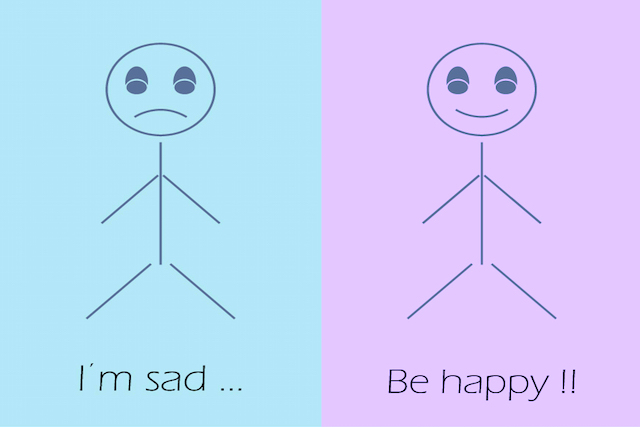
“Develop a mind that is vast like the water, where experiences both pleasant and unpleasant can appear and disappear without conflict, struggle, or harm. Rest in a mind like vast water.” ~Buddha
When I think about having to be happy all of the time, I feel a certain kind of pressure. Sure, it’s different now then it was. But that doesn’t mean there aren’t cycles when I question everything.
Sometimes I can catch myself thinking that everything would magically fall into place if I had all the success I want in my career, the happily-ever-after relationship without any issues, or anything else I seemingly need.
Happy enough that I didn’t care, I’d walk around like a beaming light where everyone saw my radiance and adored me.
It’s a noble wish. I can envy those who seem happy all of the time and seemingly have it all together. The problem is, it’s a dream of perfection. On a day when I don’t feel happy or like a dark cloud is passing over my head, I can feel I’ve failed at life.
The pressure to be happy actually makes me unhappy. And when I feel sorrow or pain or depression, I can fear it’ll never go away. I worry the prize of arriving to this Big Beautiful Happy Life isn’t mine to have in the first place.
Here are three things I’ve learned to get through the lows that have helped me change the way I view my life and myself.
1. Moments of real connection often stem from acknowledging our struggles.
Sometimes when I was in the dumps, I wanted to hide and isolate myself. But shared moments of loving connection didn’t always have to happen when I was my happiest self.
When I look at my closest friendships, I realize what helped form them into solid, supportive relationships were through moments of shared vulnerability.
True intimacy came when I revealed what I was feeling or what I was going through, opening up to a deeper emotional honesty.
Not feeling afraid to share truthfully what was going on for me allowed another person in more profoundly. And because of this, others felt safer to be real with me. They didn’t worry I’d judge them for how they felt on any given day and I’d have compassion.
It’s the heart where true connection lies, not just in times of laughter and shared happiness. And forming a loving bond through times of difficulty gave us more appreciation for the shared joys that did arise.
I learned how to do this though without being in a victim mentality. If I shared what I was feeling with a sense of neediness or wanting the other to help me, fix me, save me, it was harder to be around me.
But if I shared with a sense of 100% responsibility for my feelings and issues, others trusted I would take care of myself without having to do anything for me.
I could say, “I’m having a difficult time and this is what I’m learning about myself.”
My intention for self-awareness and an interest to solve my own problems with humility gave people space to be with me without feeling burdened.
And this in return (although not expected) allowed reciprocity.
2. Peaceful acceptance is more important, and more sustainable, than happiness.
I can be hard on myself.
This idea of a perfect life—to not be messy, mixed-up, afraid, and feeling small—makes those days when I’m down much harder.
Now, I just let those dark days be. Or more than that, I know even though those times suck royally, I’m growing.
Now, I focus on what can make me feel peaceful rather than happy. There’s a lot more room then to get stronger and bring back the fire that seems to have left me.
I do grounded, simple things that bring me joy—like knitting, reading a good novel, seeing a play, or taking a long walk in a different neighborhood.
These small moments of taking the day easy and allowing with grace brings me inner-balance, which I discovered is most needed in these kinds of down-and-outs.
Just chilling out and taking the strain off helps me feel more present, alive, and clear. And that is far more sustaining than the elated, euphoric states I can have when something great does happen for me.
Those super-over-the-top kind of happy moments are fleeting and transitory. They pass by quickly as I return to daily life.
Creating peace rather than striving for constant happiness gets me off the hook. Free of drama, stress, and anxiety, I take it easy even if I still feel messed up. Then, I’m even keel and that’s a lovely feeling.
It’s really kind of refreshing. In reality, I don’t have to do anything or get anything to be happy. I just get to be me.
3. Periods of uncertainty do pass, but it’s how we hold them in the present that matters most.
I’ve learned I can feel down when I’m not feeling on purpose or when I’m unsure of what’s next.
Not knowing what’s going to happen, I can fear I’ll be stuck in the muck, unsafe, unlovable, and not enough.
That in-between space is uncomfortable and disquieting. If I don’t feel on point, motivated, or like I’m getting what I want immediately, I can think I’ve failed in life.
As an artist, I can worry my next creative project won’t come or fear I will never fall in love again.
This kind of future thinking is the death to my happiness—because I can think there’s something wrong with me for not having it all figured out.
What I do in these times is . . . nothing big.
I focus on nurturing myself and find the easiest thing I can do. I apply what’s gentle, loving, and kind. I ask my spirit what it needs rather than my ego that’s striving for happiness.
I accept it as a time to go within rather than seek pleasure without—a gentle time to restore and regenerate, giving myself space to prepare inwardly for the new.
Truth is, there are sometimes slow moving streams and still pools, and I can’t force a river no matter how much I want to.
My learning is not to flee from my sense of emptiness but to loosen my grip and relax into the gap. Like a trapeze artist letting go of one bar and reaching for the next, I trust it’s in this very space that the new is discovered.
I try to honor the passages without forcing anything. As I take tender steps toward my endeavors, I allow the beauty of the next to arise according to its own timing.
Somehow I’m freer even if I happen to be unhappy. I know it’s not really the truth of my being. And that’s a very cool thing.
(Kinda’ something that makes me happy . . .)
What gives you a sense of peaceful aliveness? In what ways can you connect more with others? How might you meet transition cultivating a sense of “easy”? And how might all of this give you more permission to be?
Be happy image via Shutterstock
About Lynn Newman
Lynn Newman has a Masters in Counseling Psychology, is a writer, painter, and game creator (like The Game of You & The Game of Insight – An Interactive Way To Know Yourself, Create The Life You Want). She’s big into unleashing the truest, free-est parts of you, to experience more joy, purpose, and passion in life. Visit her at LynnNewman.com.













 Though I run this site, it is not mine. It's ours. It's not about me. It's about us. Your stories and your wisdom are just as meaningful as mine.
Though I run this site, it is not mine. It's ours. It's not about me. It's about us. Your stories and your wisdom are just as meaningful as mine.